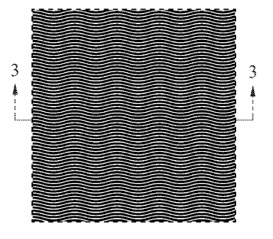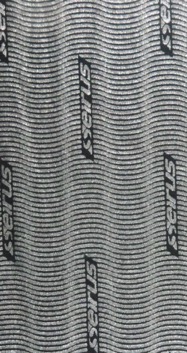PATENT CASE OF THE WEEK
Columbia Sportswear North America, Inc. v. Seirus Innovative Accessories, Inc., Appeal Nos. 2018-1329, et al. (Fed. Cir. Nov. 13, 2019)
This week’s Case of the Week strikes close to home, tried at the district court and argued at the Federal Circuit by the co-editor of Fresh From the Bench, Nika Aldrich.
The case centers around patents concerning Columbia’s patented Omni-Heat® Reflective line of products—products that have a partial reflective coating on the inside surface. Columbia obtained both utility patents and design patents covering its inventions. The utility patents recite, generally, a piece of “body gear” with “heat reflective elements” arranged in a “discontinuous array” covering 30-70% of the innermost surface of the garment.
The design patent at issue covers an ornamental design for “Heat Reflective Material” as follows:

Seirus makes gloves with partial heat reflective fabric on the inside surface. The fabric appears as follows:

The district court granted summary judgment that the design patent was infringed, and the parties went to trial on the question of damages, setting up the first post-Samsung trial on issues concerning Section 289 and design patent damages. On the eve of trial, the Court transferred the case to the Southern District of California, following the Supreme Court’s decision in T.C. Heartland. At trial, the jury awarded Columbia more than $3 million in disgorgement of Seirus’s profits for the infringement of the design patent. The jury also found the utility patent claims anticipated and obvious over a combination of prior art references.
Columbia appealed the venue transfer, arguing that the Federal Circuit’s decision in In re Micron required the Court to leave the case in Oregon. Columbia also challenged the jury verdict of invalidity. Seirus cross-appealed the Court’s grant of summary judgment of infringement, and the jury’s verdict concerning Seirus’s profits under Section 289.
Utility Patent—Obviousness and False Evidence
The Federal Circuit declined to reach the question of anticipation by instead holding the utility patent claims were invalid as obvious. Columbia had argued that Seirus failed to submit competent expert testimony to support its invalidity theory because the expert failed to properly apply the law. The Federal Circuit avoided this issue by concluding that no expert testimony was required in this case:
[W]e are not persuaded that the legal determination of obviousness in this case requires such evidence. The technology here—coated materials for cold weather and outdoor products—is “easily understandable without the need for expert explanatory testimony.” Perfect Web Techs., Inc. v. InfoUSA, Inc., 587 F.3d 1324, 1329 (Fed. Cir. 2009).
Columbia also argued that it was entitled to a new trial based on false evidence submitted by that same expert concerning one of the prior art references. “Both Seirus and Columbia agree that this testimony was incorrect.” The Court held that a new trial was not required, finding the case to be not comparable to two prior cases where a new trial was required. Fraige v. American-National Watermattress Corp., 996 F.2d 295 (Fed. Cir. 1993), and Rembrandt Vision Technologies, L.P. v. Johnson & Johnson Vision Care, Inc., 818 F.3d 1320 (Fed. Cir. 2016). The court concluded:
The jury could have easily verified any representations about the reference. Moreover, Columbia had ample opportunity to cross-examine Dr. Block on his incorrect understanding of Fottinger’s disclosure. Under these circumstances and given the uncomplicated nature of the evidence, we cannot conclude that Dr. Block’s misstatements warrant a new trial.
Design Patent—Use of Logos and Damages
The Court reversed the district court’s summary judgment decision, finding triable issues of fact concerning infringement. Most significantly, the Court addressed the extent to which the use of logos in an accused product can be relevant to whether a party infringes a design patent. In L.A. Gear, Inc. v. Thom McAn Shoe Co., 988 F.2d 1117, 1124 (Fed. Cir. 1993), the Court had held: “Design patent infringement relates solely to the patented design, and does not … allow for avoidance of infringement by labelling.” That case involved shoes, and the infringing product had the word “balloons” on the side of it:

In the present case, the Court distinguished L.A. Gear and appeared to put an intent requirement into the law:
A would-be infringer should not escape liability for design patent infringement if a design is copied but labeled with its name. But L.A. Gear does not prohibit the fact finder from considering an ornamental logo, its placement, and its appearance as one among other potential differences between a patented design and an accused one. Indeed, the fact finder is tasked with determining whether an ordinary observer would find the “effect of the whole design substantially the same.” Gorham Co. v. White, 81 U.S. 511, 530 (1972). It would be inconsistent with this mandate to ignore elements of the accused design entirely, simply because those elements included the name of the defendant.
Based on Seirus’s use of the logo and Seirus’s allegations concerning differences in the shape and size of the wavy lines, the Court remanded for new trial on infringement.
Having concluded that a new trial on infringement is required, the Court declined to reach the multiple damages issues the parties had briefed.
Venue
With respect to the venue transfer, the Court held that the district court did not abuse its discretion in transferring the case to California even though it had found that Seirus waived its venue defense through “non-rule based waiver,” as such waiver was described in the Federal Circuit’s later decision in In re Micron. The Federal Circuit explained, “Because the district court did not abuse its discretion in excusing Seirus’s waiver of its venue defense, we do not find that the district court needs to retransfer this case back to Oregon.” It is unclear from the decision whether the district court may choose to do so.
The opinion can be found here.
ALSO THIS WEEK
Koninklijke KPN N.V. v. Gemalto M2M Gmbh, Appeal Nos. 2018-1863 et al. (Fed. Cir. Nov. 15, 2019)
In this case, the Federal Circuit reversed the district court’s dismissal of an infringement case under 35 U.S.C. § 101, finding three dependent claims of a data transmission error detection patent not directed to patent-ineligible subject matter. The claims were directed to an improved method of generating check data for the detection of transmission errors, subjecting the data to varying permutations for different transmitted data blocks. This was to avoid a prior art problem wherein certain systematic errors would produce the same defective check data across different data blocks, masking the existence of the error. The claims recited a device configured to perform certain modifications on such permutations, and the Court rejected appellees’ assertion that because the claims failed to recite a step using the check data to perform error detection, they were not tied to a “concrete application” and were therefore abstract. Instead, the Court held that claims directed to improving the functionality of one tool that is part of an existing system need not necessarily recite how that tool is applied to the overall system. The Court further held that because the claims specified that permutations would be modified “in time,” they recited a sufficiently specific solution to avoid being directed to the abstract idea of simply achieving a desired result.
The opinion can be found here.